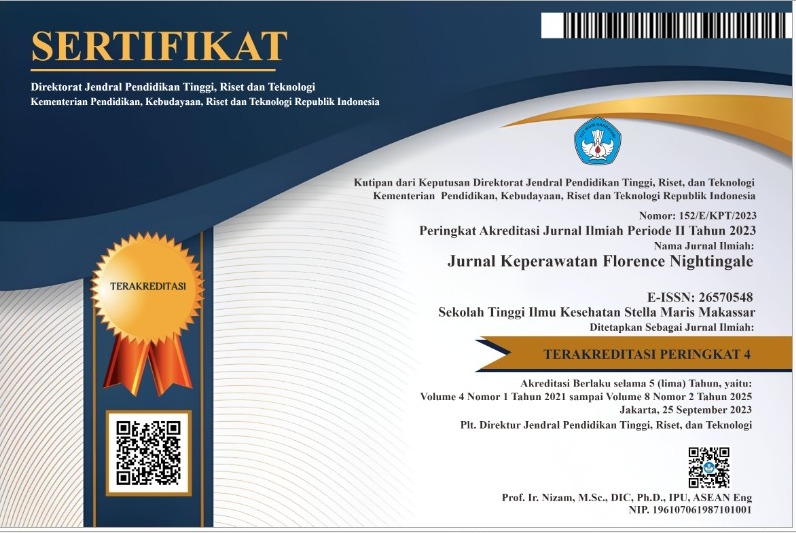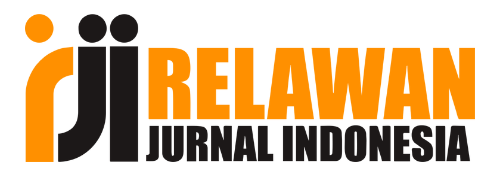The Influence of Family and Social Support on Improving Health Status and Self-Care Management of DM: A Systematic Review
Keywords:
Diabetes Mellitus, Family Support Center, Health Education, Self-Care Managemen, Social SupportAbstract
The prevalence of type 2 diabetes mellitus (T2DM) is increasing in low- and middle-income countries, caused by obesity, unhealthy eating patterns, sedentary behavior, and aging. Social support, both from family and friends, is recognized as an important factor in improving health habits and disease management, especially in the case of diabetes. Family education of patients with T2DM can improve self-care behavior and motivation, playing a key role in the concept of family-centered empowerment. This research used a systematic review, where articles were searched in four leading databases, namely Scopus, ProQuest, ScienceDirect, and SAGE, starting from early May 2024. The search was carried out using a combination of keywords and MESH terminology related to family and social support in diabetes mellitus patients. Articles selected for review were then evaluated in depth by researchers using JBI critical appraisal tools to address bias. Based on the selection of articles, a total of 10 articles were deemed appropriate for researchers and stated that they had significant results and statements regarding the influence of family and social support in the self-care management of diabetes mellitus sufferers. Family and social support have an impact on diabetes patients through both face-to-face interventions and telenursing, highlighting the ongoing need for continuous support.
Downloads
References
Alyahya, M. S., Al-Sheyab, N. A., Alqudah, J. A., Younis, O. B., & Khader, Y. S. (2021). Effect of Multimedia Messaging Service on Exercise Self-efficacy in Diabetic Patients.
Alyahya, M. S., Al-Sheyab, N. A., Khader, Y. S., & Alqudah, J. A. (2023). Impact of Multimedia Messaging Service Education and Exercise Social Support on Physical Activity Among Patients With Type 2 Diabetes: Quasi-Experimental Study. JMIR Formative Research, 7. https://doi.org/10.2196/42590
Ammmentorp, J., Thomsen, J., Kofoed, P.-E., Gregersen, T. A., Bassett, B., & Timmermann, C. (2020). Understanding how different mechanism of life coaching offered to young adults with type 1 diabetes can improve their ability to see opportunities and overcome barriers. Patient Education and Counseling, 103(3), 544–548. https://doi.org/https://doi.org/10.1016/j.pec.2019.10.010
Andersen, J. A., Felix, H., Selig, J., Rowland, B., Bing, W., Hudson, J., Niedenthal, J., Otuafi, H., Riklon, S., Azures, E., George, A., & McElfish, P. A. (2021). Feasibility and efficacy of a pilot family model of diabetes self-management intervention in the Republic of the Marshall Islands. Contemporary Clinical Trials Communications, 23. https://doi.org/10.1016/j.conctc.2021.100824
Carolina, A., Hovadick, A., Reis, I. A., Torres, H. C., Carv, H., & Torres, A. (n.d.). Short Message Service (SMS) and self-care promotion in type 2 DM: an integrative review. https://doi.org/10.1590/1982
Cho, M. K., & Kim, M. Y. (2021). The relationship between diabetes family conflict and parental conflict on problem recognition in illness self-management among individuals with type 1 diabetes mellitus. International Journal of Environmental Research and Public Health, 18(17). https://doi.org/10.3390/ijerph18178914
Dima Kristaningrum, N., Azizah Ramadhani, D., & Sri Hayati, Y. (2021). Correlation between the burden of family caregivers and health status of people with diabetes mellitus. In Journal of Public Health Research (Vol. 10).
Enggarwati, P., Dahlia, D., & Maria, R. (2022). Social support as a mediator between depressive symptoms and self-care activities in adults patient with type 2 diabetes mellitus. In Journal of Public Health Research (Vol. 11).
Hilliard, M. E., Tully, C., Monaghan, M., Hildebrandt, T., Wang, C. H., Barber, J. R., Clary, L., Gallagher, K., Levy, W., Cogen, F., Henderson, C., Karaviti, L., & Streisand, R. (2022a). First STEPS: Primary Outcomes of a Randomized, Stepped-Care Behavioral Clinical Trial for Parents of Young Children With New-Onset Type 1 Diabetes. Diabetes Care, 45(10), 2238–2246. https://doi.org/10.2337/dc21-2704
Hilliard, M. E., Tully, C., Monaghan, M., Hildebrandt, T., Wang, C. H., Barber, J. R., Clary, L., Gallagher, K., Levy, W., Cogen, F., Henderson, C., Karaviti, L., & Streisand, R. (2022b). First STEPS: Primary Outcomes of a Randomized, Stepped-Care Behavioral Clinical Trial for Parents of Young Children With New-Onset Type 1 Diabetes. Diabetes Care, 45(10), 2238–2246. https://doi.org/10.2337/dc21-2704
IDF. (2020). Diabetes facts & figures.
JBI. (2023). Critical Appraisal Tools.
Karingga, D. D., Efendi, F., Indarwati, R., & Bushy, A. (2023a). Effect of mobile structured educational applications on self-care management in diabetes mellitus patients. Gaceta Medica de Caracas, 131(2), 278–286. https://doi.org/10.47307/GMC.2023.131.2.3
Karingga, D. D., Efendi, F., Indarwati, R., & Bushy, A. (2023b). Structured educational app in improving self-care management in diabetes mellitus patients: systematic review. International Journal of Public Health Science, 12(3), 1218–1225. https://doi.org/10.11591/ijphs.v12i3.22772
Khawaja, N., Abu-Shennar, J., Saleh, M., Dahbour, S. S., Khader, Y. S., & Ajlouni, K. M. (2019). The prevalence and risk factors of peripheral neuropathy among patients with type 2 diabetes mellitus; The case of Jordan. Diabetology and Metabolic Syndrome, 10(1). https://doi.org/10.1186/s13098-018-0309-6
Kumar, L., & Mohammadnezhad, M. (2022). Perceptions of patients on factors affecting diabetes self-management among type 2 diabetes mellitus (T2DM) patients in Fiji: A qualitative study. Heliyon, 8(6). https://doi.org/10.1016/j.heliyon.2022.e09728
Lawson, M. L., Shephard, A. L., Feenstra, B., Boland, L., Sourial, N., & Stacey, D. (2020). Decision coaching using a patient decision aid for youth and parents considering insulin delivery methods for type 1 diabetes: A pre/post study. BMC Pediatrics, 20(1). https://doi.org/10.1186/s12887-019-1898-4
Luca, P., Haugrud, B., Husband, A., Dawrant, J., & Pacaud, D. (2018). Evaluation of a Diabetes Coach Program Aimed to Improve the Care of Children and Youth With Type 1 Diabetes and With Compromised Control. Canadian Journal of Diabetes, 42(5), 540–544. https://doi.org/10.1016/j.jcjd.2018.01.005
Melissa Spezia Faulkner, & DSN, R. L.-I. C. M. (2007). Family Influence on Self-Care, Quality of Life, and Metabolic Control in School-Age Children and Adolescents with Type 1 Diabetes.
Mezil, S. A., & Ahmed, B. (2021). Complication of Diabetes Mellitus (Vol. 25). http://annalsofrscb.ro
Misra, A., Gopalan, H., Jayawardena, R., Hills, A. P., Soares, M., Reza-Albarrán, A. A., & Ramaiya, K. L. (2019). Diabetes in developing countries. Journal of diabetes, . 11(7).
Muzy, J., Campos, M. R., Emmerick, I., da Silva, R. S., & de Andrade Schramm, J. M. (2021). Prevalence of diabetes mellitus and its complications and characterization of healthcare gaps based on triangulation of studies. Cadernos de Saude Publica, 37(5). https://doi.org/10.1590/0102-311X00076120
Oluchina, S. (2022). The effectiveness of an education intervention based on self-care model on diabetes self-management behaviors and glycemic control. International Journal of Africa Nursing Sciences, 17. https://doi.org/10.1016/j.ijans.2022.100505
Oluchina, S., & Karanja, S. (2022). Barriers to diabetes self-management in primary care settings – Patient perspectives: Phenomenological design. International Journal of Africa Nursing Sciences, 17. https://doi.org/10.1016/j.ijans.2022.100465
Pender, M. N. (2011). The Health Promotion Model. http://nursing.umich.edu/faculty-staff/nola-j-pender
Ramfelt, K., Petersson, C., & Åkesson, K. (2020). Experiences From a Coaching Program for Parents of Children and Adolescents With Type 1 Diabetes Developed Through Experienced-Based Co-Design (EBCD). Journal of Patient Experience, 7(6), 1181–1188. https://doi.org/10.1177/2374373520969005
Rostaminasab, S., Nematollahi, M., Jahani, Y., & Mehdipour-Rabori, R. (2023). The effect of family-centered empowerment model on burden of care in parents and blood glucose level of children with type I diabetes family empowerment on burden of care and HbA1C. BMC Nursing, 22(1). https://doi.org/10.1186/s12912-023-01375-w
Shahabi, N., Kolivand, M., Salari, N., & Abbasi, P. (2022). The effect of telenursing training based on family-centered empowerment pattern on compliance with diet regimen in patients with diabetes mellitus type 2: a randomized clinical trial. BMC Endocrine Disorders, 22(1). https://doi.org/10.1186/s12902-022-00953-4
Sheikhi, H. R., Amini Heydari, M., Soleimani, M., Sheikhi, A. R., Mastaelizadeh, H., & Naderyanfar, F. (2019). The effect of family-centered education on self-care rate in patients with type 2 diabetes. www.japer.in
Shi, M., Xu, M.-Y., Liu, Z.-L., Duan, X.-Y., Zhu, Y.-B., Shi, H.-M., Jiang, B., Zhang, X.-M., & Yu, X.-H. (2016). Effectiveness of family involvement in newly diagnosed type 2 diabetes patients: a follow-up study. Patient Education and Counseling, 99(5), 776–782. https://doi.org/https://doi.org/10.1016/j.pec.2015.12.018
Sukartini, T., Theresia Dee, T. M., Probowati, R., & Arifin, H. (2020). Behaviour model for diabetic ulcer prevention. Journal of Diabetes and Metabolic Disorders, 19(1), 135–143. https://doi.org/10.1007/s40200-019-00484-1
Thojampa, S. (2019). Knowledge and self-care management of the uncontrolled diabetes patients. International Journal of Africa Nursing Sciences, 10, 1–5. https://doi.org/10.1016/j.ijans.2018.11.002
WHO. (2024). Diabetes. https://www.who.int/health-topics/diabetes#tab=tab_2
Zhou, B., Lu, Y., Hajifathalian, K., Bentham, J., Di Cesare, M., Danaei, G., Bixby, H., Cowan, M. J., Ali, M. K., Taddei, C., Lo, W. C., Reis-Santos, B., Stevens, G. A., Riley, L. M., Miranda, J. J., Bjerregaard, P., Rivera, J. A., Fouad, H. M., Ma, G., … Cisneros, J. Z. (2016). Worldwide trends in diabetes since 1980: A pooled analysis of 751 population-based studies with 4.4 million participants. The Lancet, 387(10027), 1513–1530. https://doi.org/10.1016/S0140-6736(16)00618-8
Published
How to Cite
Issue
Section
Copyright (c) 2024 Devangga Darma Karingga, Indah Jayani, Idola Perdana Sulistyoning Suharto, Moh Alimansur, Eva Dwi Ramayanti

This work is licensed under a Creative Commons Attribution-ShareAlike 4.0 International License.









